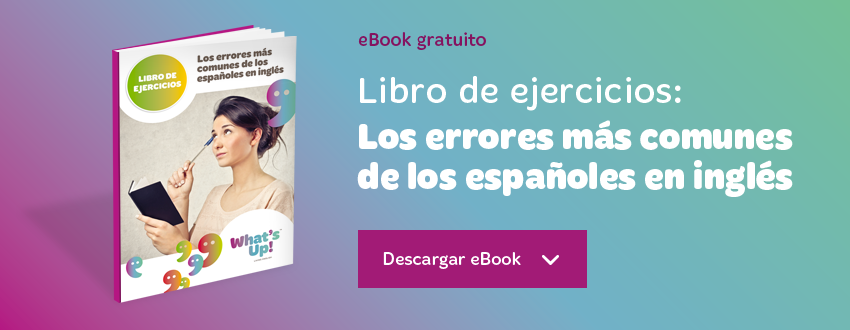What's Up! blog
el mejor contenido del mejor curso de inglés
Futuro continuo en inglés: ejercicios para aprender a usarlo sin errores
¿Conoces todas las formas que existen en inglés para expresar el futuro? Hoy te hablamos del Futuro Continuo en inglés, un tiempo verbal que aunque no se usa a diario es importante que lo conozcas. Además te proponemos unos ejercicios para que no cometas errores al usarlo.
Futuro continuo en inglés: Usos
Forma: El futuro continuo en inglés se forma con el auxiliar will/shall + be + verbo en –ing.
Uso: El futuro continuo se utiliza para hablar de acciones que tendrán lugar en futuro y tendrán cierta duración. Este tiempo se utiliza a menudo cuando el hablante quiere enfatizar una acción o evento que sucederá en el futuro, o cuando quiere remarcar la diferencia entre lo que sucede en el momento de hablar y lo que sucederá en el futuro.
Además, el futuro continuo se utiliza para expresar que algo estará sucediendo a la vez que otra acción, ambas en el futuro. En este sentido podemos decir que se comporta de forma similar al pasado continuo, pero para hablar de lo que sucederá en el futuro.
Ejemplos:
Next week, I will be flying to Paris.
This time tomorrow, I will be getting married.
We will be sleeping while she takes the train.
Futuro Continuo vs. Futuro Perfecto
Es importante no confundir el uso del futuro continuo con el uso del futuro perfecto, ya que aunque ambos tiempos verbales se utilizan para hablar de acciones que sucederán en el futuro el Futuro Perfecto se usa para decir que una acción estará terminada en un momento específico del futuro.
Ejemplos:
In 5 years time, I’ll have finished university.
I’ll have finished all my homework by tomorrow morning.
Futuro en inglés: Going to
El “going to” es otra manera de expresar el futuro en inglés (decisiones, intenciones, predicciones con alto grado de fiabilidad,…). En el siguiente artículo puedes encontrar esta y otras formas de hablar del futuro en inglés.
Práctica – Ejercicios con el Futuro Continuo en inglés
Para cada oración, elige la opción correcta de entre las tres que te ofrecemos. Las soluciones se encuentran al final del post.
1. We can watch a movie this evening. The kids ___________ to bed by then.
a) will gone
b) will have gone
c) will be going
2. By 11 o’clock tomorrow, she___________ her driving exam.
a) will have taken
b) have took
c) will take
3. She ___________ in London this time next year.
a) will be living
b) shall be living
c) will live
4. Unfortunately, I ___________ the conference in New York.
a) won’t be attended
b) will be attending
c) won’t be attending
5. When you call me, I ___________ dinner
a) will have cooked
b) will be cooking
c) will cooking
6. By this time next month, I ___________ all my studies.
a) will have finished
b) will be finished
c) will finish
7. I need your bike. ___________ it this evening?
a) will be you using
b) will have you be using
c) will you be using
8. Don’t call me at three o’clock, I ___________ an interview.
a) will have having
b) will have had
c) will be having
9. Next month, I ___________ in Dublin for 2 years
a) will be living
b) will have lived
c) will have living
10. She ___________ on the beach while we spend the day working.
a) will have relaxed
b) will be relaxing
c) will been relaxing
Solución:
1B, 2A , 3A , 4C , 5B , 6A , 7C , 8C , 9B, 10B
Post relacionados:
- Practica con estos ejercicios too much / too many
- Cómo usar el pasado en inglés. Repaso de los tiempos verbales
- Ejercicios: present simple y present continuous, ¡repásalos!



